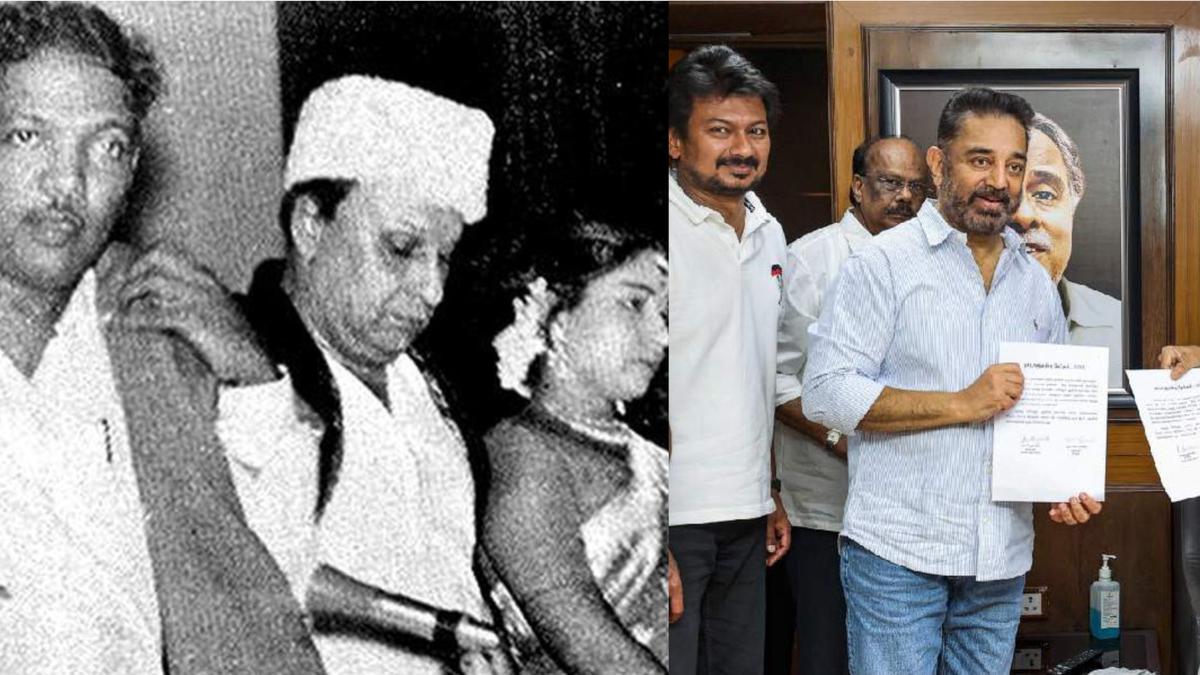
Dravidian politics and Tamil cinema: The conjoined twins of the Tamil motherland
The Hindu
As the general election approaches, we explore the intertwined history of Kollywood and Tamil Nadu politics, the evolution of cinema as a medium for propaganda and its effect on politics, and examine those who have wielded this tool over time
Cinema, in the form of documentaries, short films, feature films, and even animated cartoons, has long been used as a medium to shed light on major events or social conditions to inform and agitate the masses. Our Western counterparts have been utilising films since the days of World War 1; interestingly, before the war, French cinema had a big share of the world market and its collapse made way for Hollywood to establish its hegemony. In India, films on anti-British propaganda started the movement during British rule and to date, the medium has proved to be a formidable tool for spreading ideologies in the Dravidian states, especially in Tamil Nadu where the lines between the two fields crossover quite often.
For those new to this, two facts could probably comprehend the magnitude of the symbiotic relationship politics and cinema share in Tamil Nadu; the state has had five Chief Ministers from the world of cinema (excluding the current CM MK Stalin who gave a shot with acting in Ore Raththam in 1987), and O Panneerselvam – who took charge as the Chief Minister thrice – was the first without any link to the world of cinema to head the State government since 1967.
Fascinatingly, the current ruling party of Tamil Nadu, the Dravida Munnetra Kazhagam (DMK) was the one that understood the power of stage plays and films after understanding how films like Thyaga Bhoomi (1939) and Mathru Bhoomi (1939) penetrated the minds of the masses before Independence. So much so that Indian National Congress leader K Kamaraj asked if actors can manage presiding over a state. After independence, four Congress leaders — including C Rajagopalachari and Kamaraj — ruled the state until 1967 when the administrative power went to the hands of Dravidian parties and CN Annadurai became the first leader from a Dravidian party to turn CM of TN (then Madras State).
An excellent orator and writer, Annadurai pushed his ideologies through his writing that were made into films like Velaikari (1949) which was inspired by the Alexandre Dumas novel ‘The Count of Monte Cristo’, Nallathambi (1949) which was adapted from the Hollywood film Mr. Deeds Goes to Town, and Ore Iravu (1951). The films focussed on tropes such as the disparity between the castes and classes and promoted social justice and education. Speaking of Velaikari and Ore Iravu, their lead actor KR Ramasamy, who previously staged both stories as plays, is said to be the first Tamil actor to dabble with politics. Not only was he a close follower and confidante of Anna, but his plays — which he continued after turning into a film star — doubled as fundraisers for the then-novice party, DMK.
Parallely, M Karunanidhi, who, as a high school student, created the Tamil Nadu Tamil Manavar Mandram (the Dravidian Movement’s first student wing), turned into a screenwriter with the MG Ramachandran-starrer Rajakumari (1947). For MGR, an emerging actor at that time who predominantly starred in romance and action films, it was Karunanidhi’s writing in films such as Maruthanaatu Ilavarasi (1950) and Manthiri Kumari (1950) that gave him a breakthrough.
Around the same time, a youngster joined a drama troupe and worked his way up to play the lead in the stage play ‘Shivaji Kanda Hindu Rajyam’ written by CN Annadurai in the 40s that was presided over by Periyar EV Ramasami, who was then leading the Dravidar Kazhagam and the Self-respect movement. It was he who christened this young man VC Ganesan... as Sivaji Ganesan.
When the actor made his film debut with Parasakthi (1952) — alongside another actor-politician SS Rajendran — which was penned by Karunanidhi, the film was so politically charged that the then-ruling State government even demanded the film be banned. But the film, which was anti-Brahminical, commented against the caste system, took a dig at Hindu customs and was even cited as a minor reason for DMK overthrowing the Congress party in Tamil Nadu, went on to acquire a cult status. The film also paved the way to stricter censorship for films and plays which the writers bypassed by using puns and ambiguous phrases. By then, many prolific actors such as NS Krishnan and MR Radha made sure their characters were an extension of their personal ideologies which aligned with the Dravidian movement. Similarly, KB Sundarambal, a prominent face of Congress in the state, was later inducted as a member of the legislative council. Another prominent member of the Dravidian Movement was poet Bharathidasan whose writings served as a catalyst for the growth of the Self-Respect Movement.













